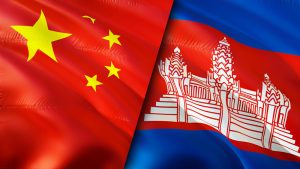Cambodia’s Prime Minister Hun Manet departed today on a three-day state visit to China, aimed at consolidating relations with his government’s closest political and economic partner.
China’s Ministry of Foreign Affairs said in a statement that Manet will attend the 20th China-ASEAN Expo in Nanning, and then meet with senior officials, including Chinese leader Xi Jinping, Premier Li Qiang, and Zhao Leji, chairman of the Standing Committee of the National People’s Congress. The statement said the leaders’ discussions will focus on ways to build a “Cambodia-China Community,” as well as addressing matters of regional and international importance.
The trip to China is Hun Manet’s first bilateral state visit since taking the reins of power from his father, long-serving Prime Minister Hun Sen, which took place last month as part of a larger generational transfer of power within the ruling Cambodian People’s Party (CPP). The new Cambodian leader is no stranger to the country, having accompanied his father on a number of recent state visits to Beijing, including one at the beginning of the COVID-19 pandemic, when China was under a heavy lockdown.
Over the past 15 years, the two nations have become intimate economic and diplomatic partners, and Chinese infrastructure loans have come to substitute for the Western development assistance on which Phnom Penh was once reliant. Cambodia has become a key participant in Xi’s Belt and Road Initiative, and Chinese state banks have financed bridges, highways, and other vital infrastructure. Chinese businesspeople of varying degrees of probity have also invested heavily in the country, lubricated by close relations with Cambodian political and business elites. The two nations have also grown closer in the security realm, the most controversial manifestation of which has been the China-backed refurbishment of the Ream Naval Base close to the port town of Sihanoukville.
Hun Manet’s visit comes shortly after Chinese Foreign Minister Wang Yi visited Phnom Penh last month, when Wang pledged that his country would work to build a “high-quality” relationship with the new-look Cambodian leadership and “conveyed China’s resounding support for the Kingdom’s emerging government leadership and development path,” according to a readout from the Cambodian Foreign Ministry. Hun Manet likewise told Wang that his new government remains “steadfast” in its stance in support of “one-China policy” and “non-interference into China’s internal affairs.”
Manet’s choice of China as the destination of his first bilateral state visit underscores what a number of writers, including this one, have argued in recent weeks: that the leadership transition in Phnom Penh will likely do little to disturb the upward trajectory of China-Cambodia relations.
While Hun Manet was educated at the U.S. Military Academy at West Point, graduating in 1999, and is likely to pursue improved relations with the United States and other Western governments, the undemocratic nature of the political system over which he holds sway is likely to complicate any immediate improvement in relations. Part of the reason is that Western governments have made significant financial and moral investments in the idea of Cambodian democracy, which they are unlikely to abandon in the interests of improved relations.
And as long as Western governments apply pressure on Phnom Penh to introduce political reforms and cease its nearly unending crackdowns on the political opposition and civil society, China will continue to loom as perhaps the perfect diplomatic partner: distant, deep-pocketed, and “non-judgemental.”

































